In today's digital landscape, forming strong partnerships is essential to combating the ever-evolving cybersecurity threats that businesses face. By collaborating with trusted experts, we can enhance our defenses and safeguard sensitive information more effectively. Imagine the impact we could make together by leveraging our combined expertise and resources. If you're curious to explore how this partnership could benefit both our organizations, I invite you to read more.

Introduction and Executive Summary
A cybersecurity partnership proposal outlines a strategic collaboration aimed at enhancing digital security measures. It focuses on addressing increasing cyber threats that affect both organizations, highlighting the necessity for robust measures in a highly digitized environment. Emphasis is placed on building a trusted alliance to share resources and expertise, ultimately improving threat intelligence and incident response capabilities. This initiative aims to utilize cutting-edge technologies and best practices to safeguard sensitive data and critical infrastructure, fostering innovation while ensuring compliance with regulations such as the General Data Protection Regulation (GDPR) and the Health Insurance Portability and Accountability Act (HIPAA). The proposal envisions a roadmap by co-developing training programs and cybersecurity frameworks to empower employees, ensuring readiness against potential cyber attacks, and enhancing overall organizational resilience.
Mutual Benefits and Objectives
Establishing a cybersecurity partnership can significantly enhance the security posture of both organizations involved. By sharing resources such as advanced threat detection technologies and incident response capabilities, both parties can bolster their defenses against cyber threats that are becoming increasingly sophisticated. Collaborative initiatives such as joint training sessions can improve the overall skill set of personnel, fostering a more resilient workforce. Furthermore, by developing shared objectives, such as reducing response times to breaches and enhancing overall data protection standards, both organizations can achieve mutual goals that benefit their operational efficiency and reputation in the industry. The partnership may also allow for the pooling of intelligence on emerging threats, enabling proactive measures that safeguard sensitive information and protect customer trust.
Proposed Solutions and Services
Proposed cybersecurity solutions and services include comprehensive risk assessments to identify vulnerabilities (potential weak points) in existing systems and infrastructure. These assessments can involve penetration testing, which simulates cyberattacks to reveal defenses' weaknesses. Implementation of Advanced Threat Detection systems utilizes artificial intelligence algorithms to monitor network traffic (data moving through a digital network) for suspicious activity in real-time. Regular security audits ensure compliance with industry regulations such as the General Data Protection Regulation (GDPR), protecting sensitive data stored by organizations. Employee training programs focus on recognizing phishing attempts (fraudulent communications) and enhancing the overall cyber hygiene of staff. Ongoing monitoring and support services offer 24/7 assistance, addressing cyber incidents promptly and minimizing downtime (periods when systems are not operational) to protect business continuity.
Security and Compliance Standards
In a rapidly evolving digital landscape, maintaining robust security and compliance standards is paramount for organizations to safeguard sensitive data against cyber threats. Cybersecurity frameworks, such as the NIST Cybersecurity Framework (National Institute of Standards and Technology), provide guidelines for managing and reducing cybersecurity risks, including aspects like data integrity and confidentiality. Regulatory requirements, such as GDPR (General Data Protection Regulation) in Europe or HIPAA (Health Insurance Portability and Accountability Act) in the United States, mandate compliance with specific security measures to protect personal information. Forming strategic partnerships can enhance collective security postures by leveraging shared knowledge, advanced threat intelligence, and innovative technologies to protect against breaches. Engaging with cybersecurity professionals can streamline the implementation of comprehensive security policies, fostering a culture of compliance within organizations and ensuring adherence to industry best practices.
Partnership Terms and Conditions
A cybersecurity partnership proposal outlines crucial terms and conditions that establish a mutual understanding between participating organizations regarding data protection. Key elements include confidentiality agreements, specifying the handling of sensitive data, and compliance with regulations such as GDPR (General Data Protection Regulation) in the European Union and CCPA (California Consumer Privacy Act) in the United States, which mandate strict data processing protocols. Additionally, the proposal should address the sharing of threat intelligence, setting clear guidelines for the exchange of information on cybersecurity threats and vulnerabilities. Liability clauses must delineate responsibilities in the event of a data breach, ensuring that both parties are aware of their obligations and the repercussions of non-compliance. Moreover, the duration of the partnership should be outlined, including options for renewal or termination, and the criteria for evaluating the partnership's effectiveness in enhancing cybersecurity measures must be established.

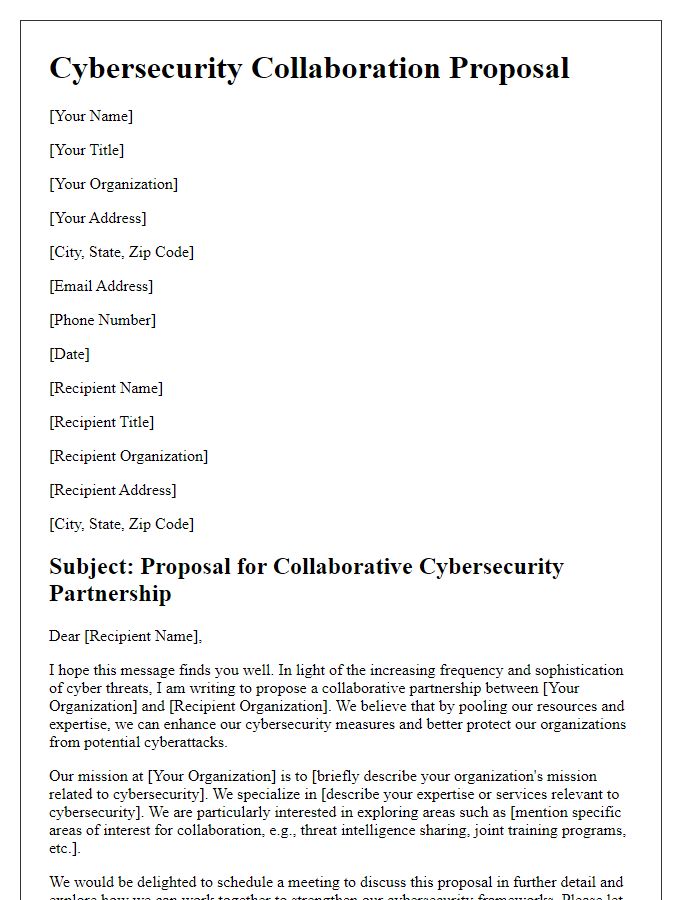

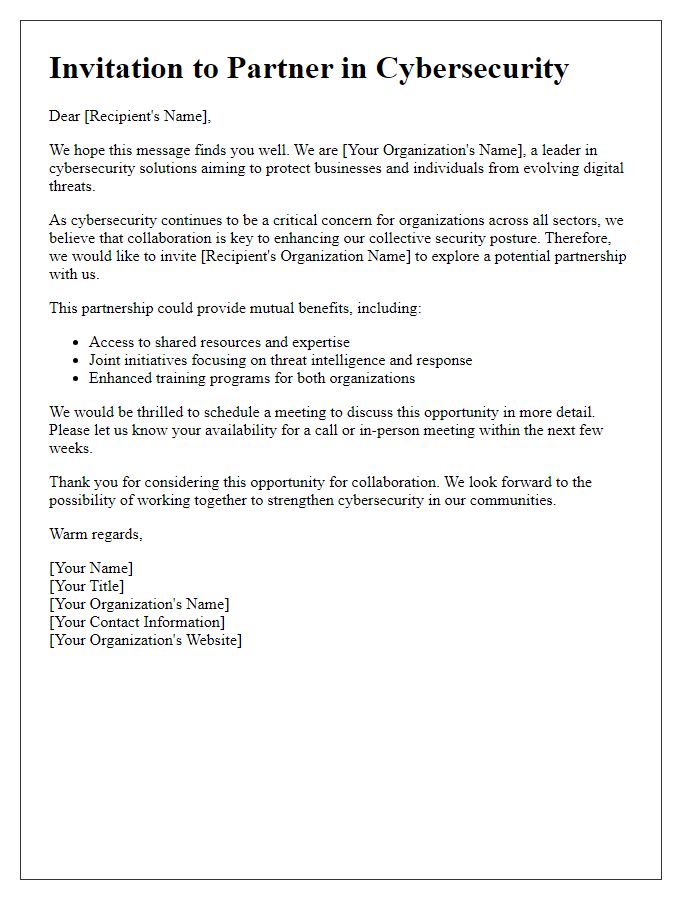
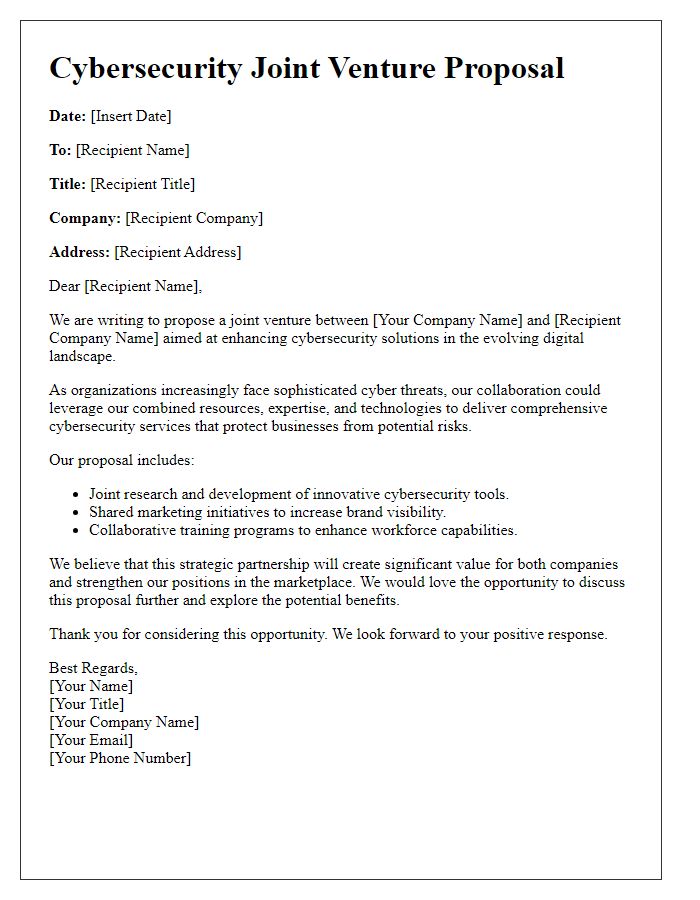

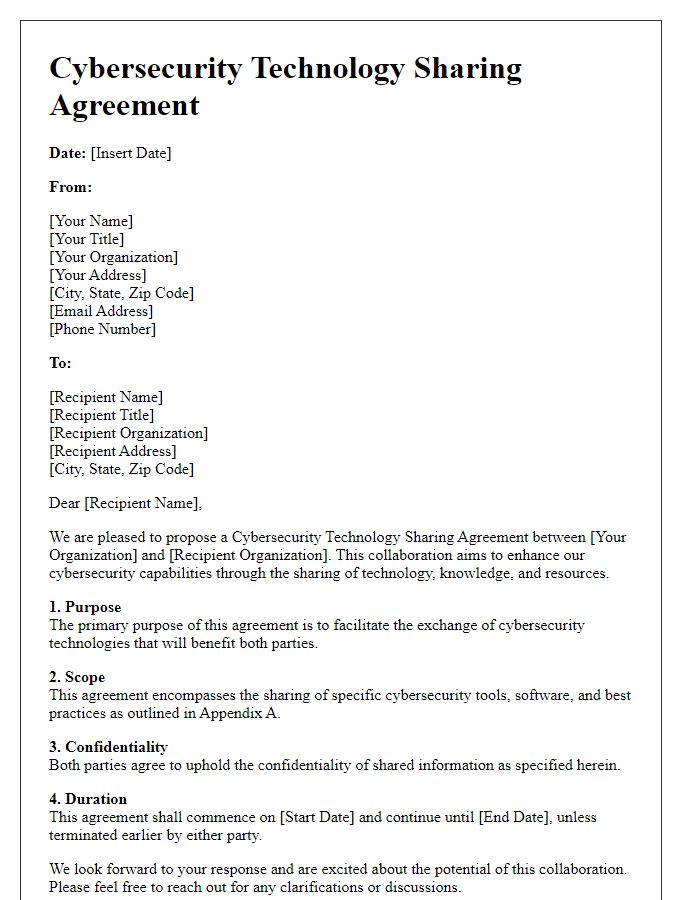
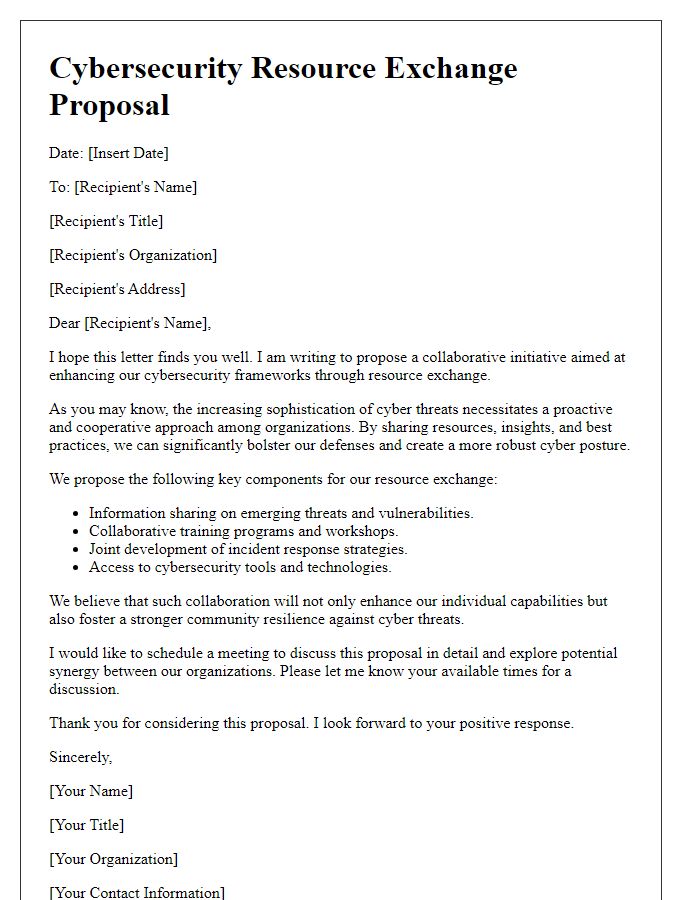
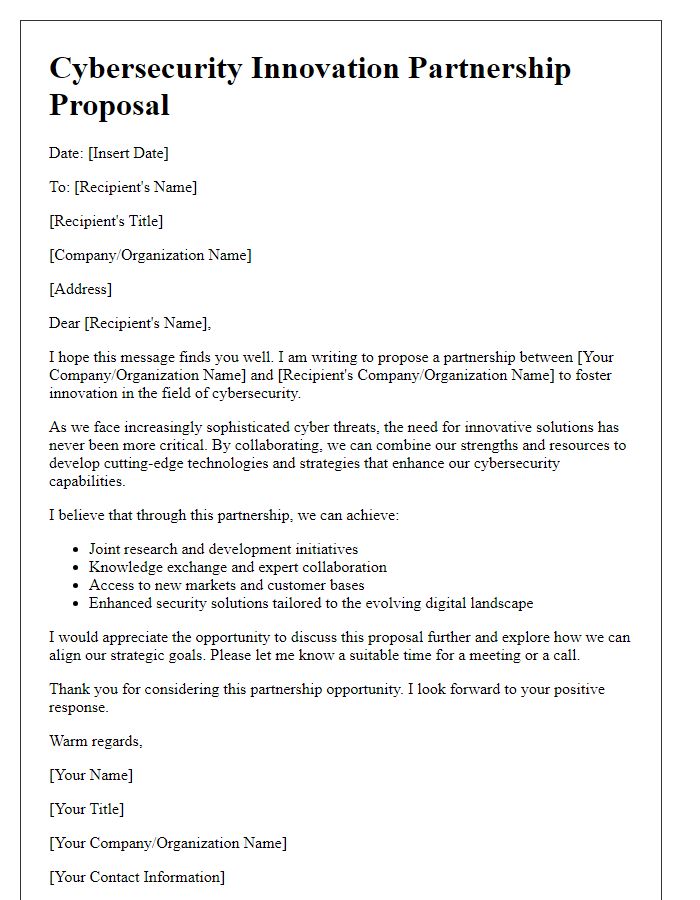
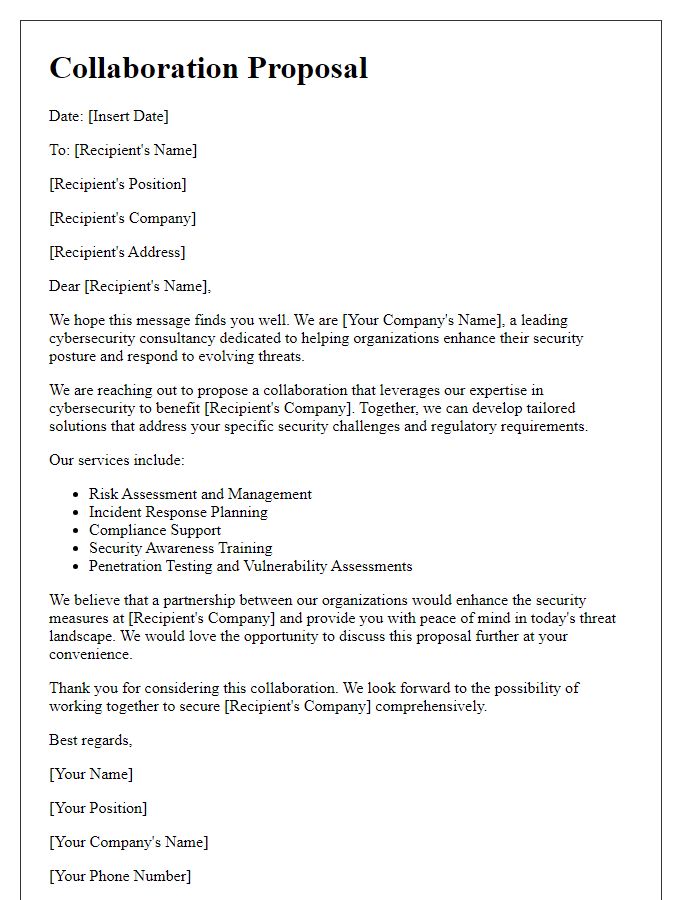
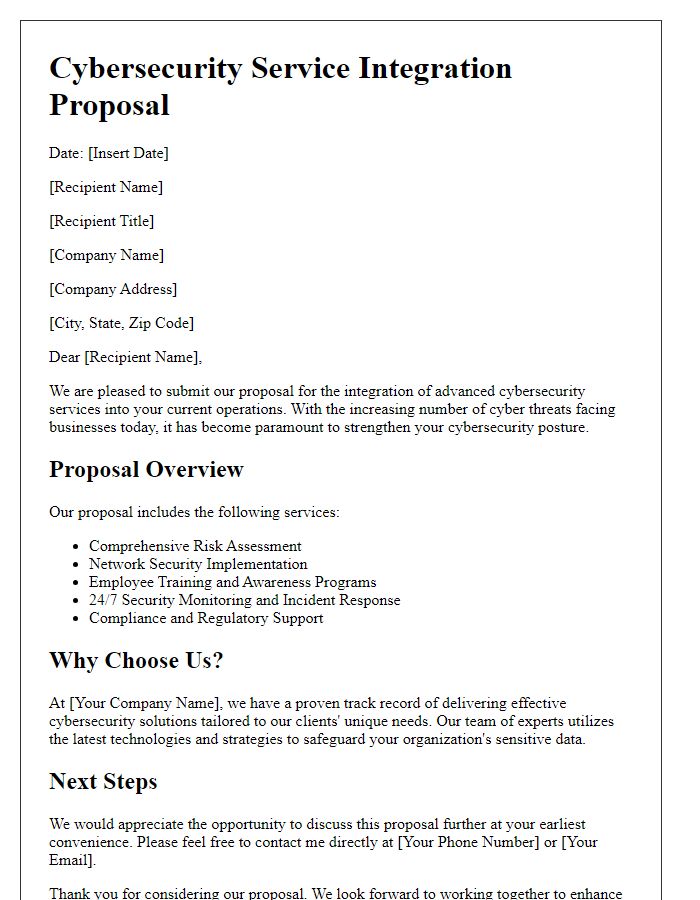


Comments